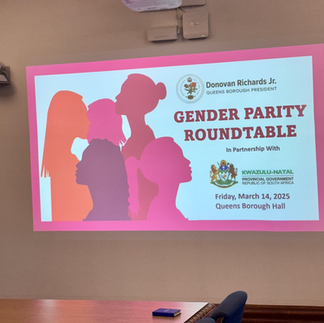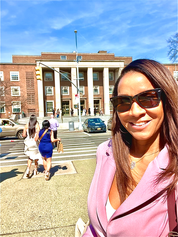A Table Set for Queens and a Global Conversation on Gender Parity
- Cathleen Trigg-Jones
- Mar 17
- 2 min read
In a world where gender parity remains a challenge across industries and borders, collaboration and conversation are key to driving meaningful change.
This was the theme of a powerful roundtable discussion I had the honor of participating in at the office of Queens Borough President Donovan Richards and Deputy Borough President Ebony Young—who is not only a fierce advocate for women and people of color but also my friend and Soror. The intimate gathering brought together some of the top female thought leaders from the U.S., along with a distinguished South African delegation, to exchange ideas, best practices, and policy recommendations to accelerate gender parity across various sectors.
Set in Queens—one of the most diverse places in the world and a true gateway between New York City and the rest of the world—the Roundtable was centered around the United Nations State of Women Summit which is engaging leaders from across the world to come together and present solutions to the global women’s crisis.
I was invited to represent iWoman and lead the discussion on Women’s Representation in Media, diving into how U.S. policy and advocacy efforts have shaped the portrayal of women and the lessons we can share globally to foster more equitable representation.
But media representation was just one of the many urgent and complex issues tackled. The roundtable addressed the barriers that continue to hold women back—from equal pay and small business access to climate change, disaster preparedness, and economic ownership.
And at the heart of it all was mental health. Identified as a silent barrier to gender equity, women across industries, across continents, and across socioeconomic backgrounds are facing unprecedented levels of stress, burnout, and emotional exhaustion—often without the resources or support they need. Too many women are silently struggling with the weight of societal expectations, workplace inequality, financial burdens, and trauma, yet conversations around mental health remain taboo in many spaces.

As Kheperah Kearse, Chief Wellbeing Officer of Life Camp, reminded us, we cannot talk about women’s rights, leadership, or progress without talking about mental wellness. Without wellbeing, there is no true empowerment.
That’s why this discussion wasn’t just about policy or advocacy—it was about compassion, empathy, and action. It was about creating safe spaces for women to be heard, seen, and supported.
The willingness of South Africa’s top leaders to listen, learn, and collaborate is a powerful reminder of what’s possible when leaders prioritize people over politics, progress over power, and unity over division.
We left the table not just with ideas but with commitments, and an invitation to continue the discussion in South Africa. We each walked away with a strong desire to keep the conversation going, and more importantly, turn words into action.
Real change happens when brilliant minds come together with purpose, vision, and the courage to act.
This is how we build a world where women are not just represented but respected. Where mental health is not just discussed but prioritized. Where gender parity is not just an ideal but a reality.






















Comments